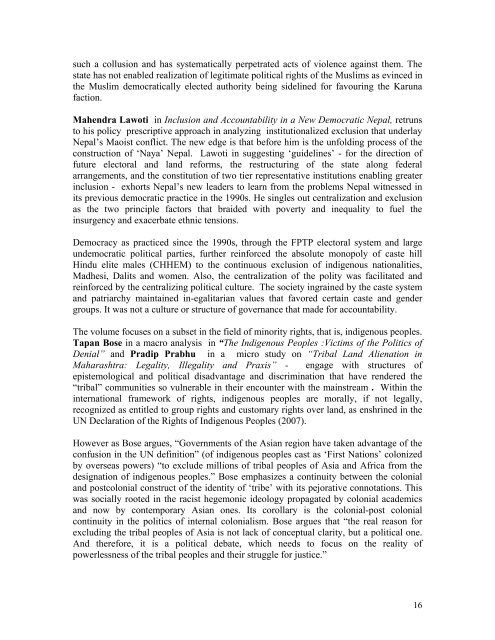Living on the Margins. Minorities in South Asia - EURAC
Living on the Margins. Minorities in South Asia - EURAC
Living on the Margins. Minorities in South Asia - EURAC
- TAGS
- minorities
- eurac
- www.eurac.edu
You also want an ePaper? Increase the reach of your titles
YUMPU automatically turns print PDFs into web optimized ePapers that Google loves.
such a collusi<strong>on</strong> and has systematically perpetrated acts of violence aga<strong>in</strong>st <strong>the</strong>m. The<br />
state has not enabled realizati<strong>on</strong> of legitimate political rights of <strong>the</strong> Muslims as ev<strong>in</strong>ced <strong>in</strong><br />
<strong>the</strong> Muslim democratically elected authority be<strong>in</strong>g sidel<strong>in</strong>ed for favour<strong>in</strong>g <strong>the</strong> Karuna<br />
facti<strong>on</strong>.<br />
Mahendra Lawoti <strong>in</strong> Inclusi<strong>on</strong> and Accountability <strong>in</strong> a New Democratic Nepal, retruns<br />
to his policy prescriptive approach <strong>in</strong> analyz<strong>in</strong>g <strong>in</strong>stituti<strong>on</strong>alized exclusi<strong>on</strong> that underlay<br />
Nepal’s Maoist c<strong>on</strong>flict. The new edge is that before him is <strong>the</strong> unfold<strong>in</strong>g process of <strong>the</strong><br />
c<strong>on</strong>structi<strong>on</strong> of ‘Naya’ Nepal. Lawoti <strong>in</strong> suggest<strong>in</strong>g ‘guidel<strong>in</strong>es’ - for <strong>the</strong> directi<strong>on</strong> of<br />
future electoral and land reforms, <strong>the</strong> restructur<strong>in</strong>g of <strong>the</strong> state al<strong>on</strong>g federal<br />
arrangements, and <strong>the</strong> c<strong>on</strong>stituti<strong>on</strong> of two tier representative <strong>in</strong>stituti<strong>on</strong>s enabl<strong>in</strong>g greater<br />
<strong>in</strong>clusi<strong>on</strong> - exhorts Nepal’s new leaders to learn from <strong>the</strong> problems Nepal witnessed <strong>in</strong><br />
its previous democratic practice <strong>in</strong> <strong>the</strong> 1990s. He s<strong>in</strong>gles out centralizati<strong>on</strong> and exclusi<strong>on</strong><br />
as <strong>the</strong> two pr<strong>in</strong>ciple factors that braided with poverty and <strong>in</strong>equality to fuel <strong>the</strong><br />
<strong>in</strong>surgency and exacerbate ethnic tensi<strong>on</strong>s.<br />
Democracy as practiced s<strong>in</strong>ce <strong>the</strong> 1990s, through <strong>the</strong> FPTP electoral system and large<br />
undemocratic political parties, fur<strong>the</strong>r re<strong>in</strong>forced <strong>the</strong> absolute m<strong>on</strong>opoly of caste hill<br />
H<strong>in</strong>du elite males (CHHEM) to <strong>the</strong> c<strong>on</strong>t<strong>in</strong>uous exclusi<strong>on</strong> of <strong>in</strong>digenous nati<strong>on</strong>alities,<br />
Madhesi, Dalits and women. Also, <strong>the</strong> centralizati<strong>on</strong> of <strong>the</strong> polity was facilitated and<br />
re<strong>in</strong>forced by <strong>the</strong> centraliz<strong>in</strong>g political culture. The society <strong>in</strong>gra<strong>in</strong>ed by <strong>the</strong> caste system<br />
and patriarchy ma<strong>in</strong>ta<strong>in</strong>ed <strong>in</strong>-egalitarian values that favored certa<strong>in</strong> caste and gender<br />
groups. It was not a culture or structure of governance that made for accountability.<br />
The volume focuses <strong>on</strong> a subset <strong>in</strong> <strong>the</strong> field of m<strong>in</strong>ority rights, that is, <strong>in</strong>digenous peoples.<br />
Tapan Bose <strong>in</strong> a macro analysis <strong>in</strong> “The Indigenous Peoples :Victims of <strong>the</strong> Politics of<br />
Denial” and Pradip Prabhu <strong>in</strong> a micro study <strong>on</strong> “Tribal Land Alienati<strong>on</strong> <strong>in</strong><br />
Maharashtra: Legality, Illegality and Praxis” - engage with structures of<br />
epistemological and political disadvantage and discrim<strong>in</strong>ati<strong>on</strong> that have rendered <strong>the</strong><br />
“tribal” communities so vulnerable <strong>in</strong> <strong>the</strong>ir encounter with <strong>the</strong> ma<strong>in</strong>stream . With<strong>in</strong> <strong>the</strong><br />
<strong>in</strong>ternati<strong>on</strong>al framework of rights, <strong>in</strong>digenous peoples are morally, if not legally,<br />
recognized as entitled to group rights and customary rights over land, as enshr<strong>in</strong>ed <strong>in</strong> <strong>the</strong><br />
UN Declarati<strong>on</strong> of <strong>the</strong> Rights of Indigenous Peoples (2007).<br />
However as Bose argues, “Governments of <strong>the</strong> <strong>Asia</strong>n regi<strong>on</strong> have taken advantage of <strong>the</strong><br />
c<strong>on</strong>fusi<strong>on</strong> <strong>in</strong> <strong>the</strong> UN def<strong>in</strong>iti<strong>on</strong>” (of <strong>in</strong>digenous peoples cast as ‘First Nati<strong>on</strong>s’ col<strong>on</strong>ized<br />
by overseas powers) “to exclude milli<strong>on</strong>s of tribal peoples of <strong>Asia</strong> and Africa from <strong>the</strong><br />
designati<strong>on</strong> of <strong>in</strong>digenous peoples.” Bose emphasizes a c<strong>on</strong>t<strong>in</strong>uity between <strong>the</strong> col<strong>on</strong>ial<br />
and postcol<strong>on</strong>ial c<strong>on</strong>struct of <strong>the</strong> identity of ‘tribe’ with its pejorative c<strong>on</strong>notati<strong>on</strong>s. This<br />
was socially rooted <strong>in</strong> <strong>the</strong> racist hegem<strong>on</strong>ic ideology propagated by col<strong>on</strong>ial academics<br />
and now by c<strong>on</strong>temporary <strong>Asia</strong>n <strong>on</strong>es. Its corollary is <strong>the</strong> col<strong>on</strong>ial-post col<strong>on</strong>ial<br />
c<strong>on</strong>t<strong>in</strong>uity <strong>in</strong> <strong>the</strong> politics of <strong>in</strong>ternal col<strong>on</strong>ialism. Bose argues that “<strong>the</strong> real reas<strong>on</strong> for<br />
exclud<strong>in</strong>g <strong>the</strong> tribal peoples of <strong>Asia</strong> is not lack of c<strong>on</strong>ceptual clarity, but a political <strong>on</strong>e.<br />
And <strong>the</strong>refore, it is a political debate, which needs to focus <strong>on</strong> <strong>the</strong> reality of<br />
powerlessness of <strong>the</strong> tribal peoples and <strong>the</strong>ir struggle for justice.”<br />
16

















